Schmitt C.B. (ed.) The Cambridge History of Renaissance Philosophy
Подождите немного. Документ загружается.

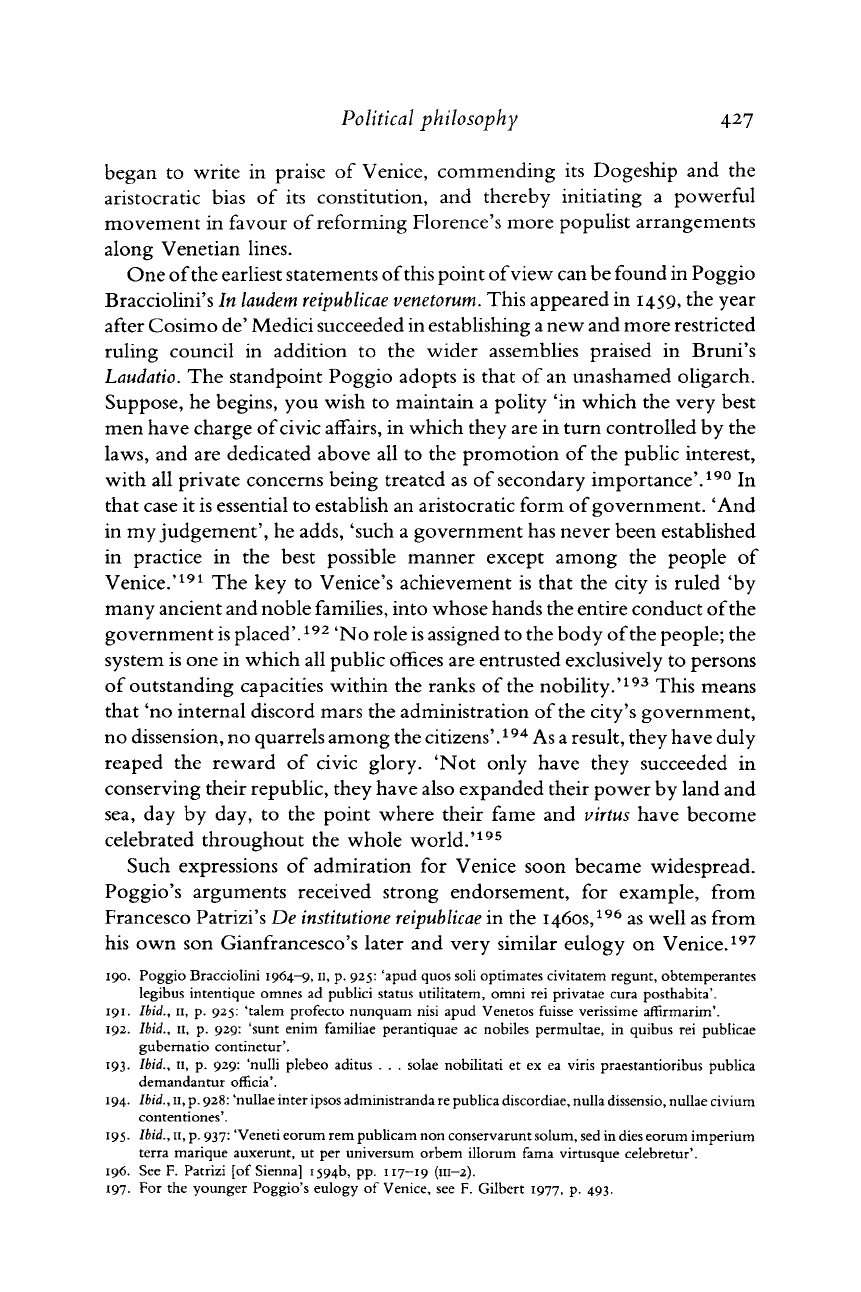
Political
philosophy
427
began to write in praise of Venice, commending its
Dogeship
and the
aristocratic
bias of its constitution, and thereby initiating a powerful
movement in favour of reforming Florence's more populist arrangements
along Venetian lines.
One
of
the earliest statements
of
this point
of
view
can be found in Poggio
Bracciolini's
In
laudem
reipublicae
venetorum.
This appeared in
1459,
the year
after
Cosimo de' Medici succeeded in establishing
a
new and more restricted
ruling council in addition to the wider assemblies praised in Bruni's
Laudatio.
The standpoint Poggio adopts is that of an unashamed oligarch.
Suppose, he begins, you
wish
to maintain a polity 'in which the very best
men have charge
of
civic affairs, in which they are in turn controlled by the
laws, and are dedicated above all to the promotion of the public interest,
with all private concerns
being
treated as of secondary importance'.
190
In
that
case it is essential to establish an
aristocratic
form
of
government. 'And
in my judgement', he adds, 'such a government has never been established
in practice in the best possible manner except among the people of
Venice.'
191
The key to Venice's achievement is that the city is ruled 'by
many ancient and noble families, into whose hands the entire conduct
of
the
government is placed'.
192
'No role is assigned to the body
of
the people; the
system is one in which all public offices are entrusted exclusively to persons
of
outstanding capacities within the ranks of the nobility.'
193
This means
that
'no internal discord
mars
the administration of the city's government,
no dissension, no
quarrels
among the citizens'.
194
As
a
result, they have duly
reaped
the reward of civic glory. 'Not only have they succeeded in
conserving their republic, they have also expanded their power by land and
sea, day by day, to the point where their fame and virtus have become
celebrated
throughout the
whole
world.'
195
Such expressions of admiration for Venice soon became widespread.
Poggio's arguments received strong endorsement, for example, from
Francesco
Patrizi's De institutione
reipublicae
in the
1460s,
196
as
well
as from
his own son Gianfrancesco's later and very similar eulogy on Venice.
197
190. Poggio
Bracciolini
1964-9,11, p. 925: 'apud
quos
soli
optimates
civitatem
regunt,
obtemperantes
legibus
intentique
omnes
ad
publici
status
utilitatem,
omni
rei privatae cura
posthabita'.
191.
Ibid., 11, p. 925:
'talem
profecto
nunquam
nisi
apud
Venetos
fuisse
verissime
amrmarim'.
192. Ibid., 11, p. 929:
'sunt
enim
familiae
perantiquae
ac
nobiles
permultae,
in
quibus
rei
publicae
gubernatio
continetur'.
193.
Ibid., 11, p. 929:
'nulli
plebeo
aditus
. . .
solae
nobilitati
et ex ea
viris
praestantioribus
publica
demandantur
officia'.
194. Ibid.,
11,
p. 928:
'nullae
inter
ipsos
administranda
re publica
discordiae,
nulla
dissensio,
nullae
civium
contentiones'.
195.
Ibid.,
11,
p. 937: 'Veneti
eorum
rem
publicam
non
conservarunt
solum,
sed in
dies
eorum
imperium
terra
marique
auxerunt,
ut per
universum
orbem
illorum
fama
virtusque
celebretur'.
196. See F. Patrizi [of
Sienna]
1594b, pp.
117-19
(111-2).
197.
For the
younger
Poggio's
eulogy
of Venice, see F. Gilbert 1977, p. 493.
Cambridge Histories Online © Cambridge University Press, 2008
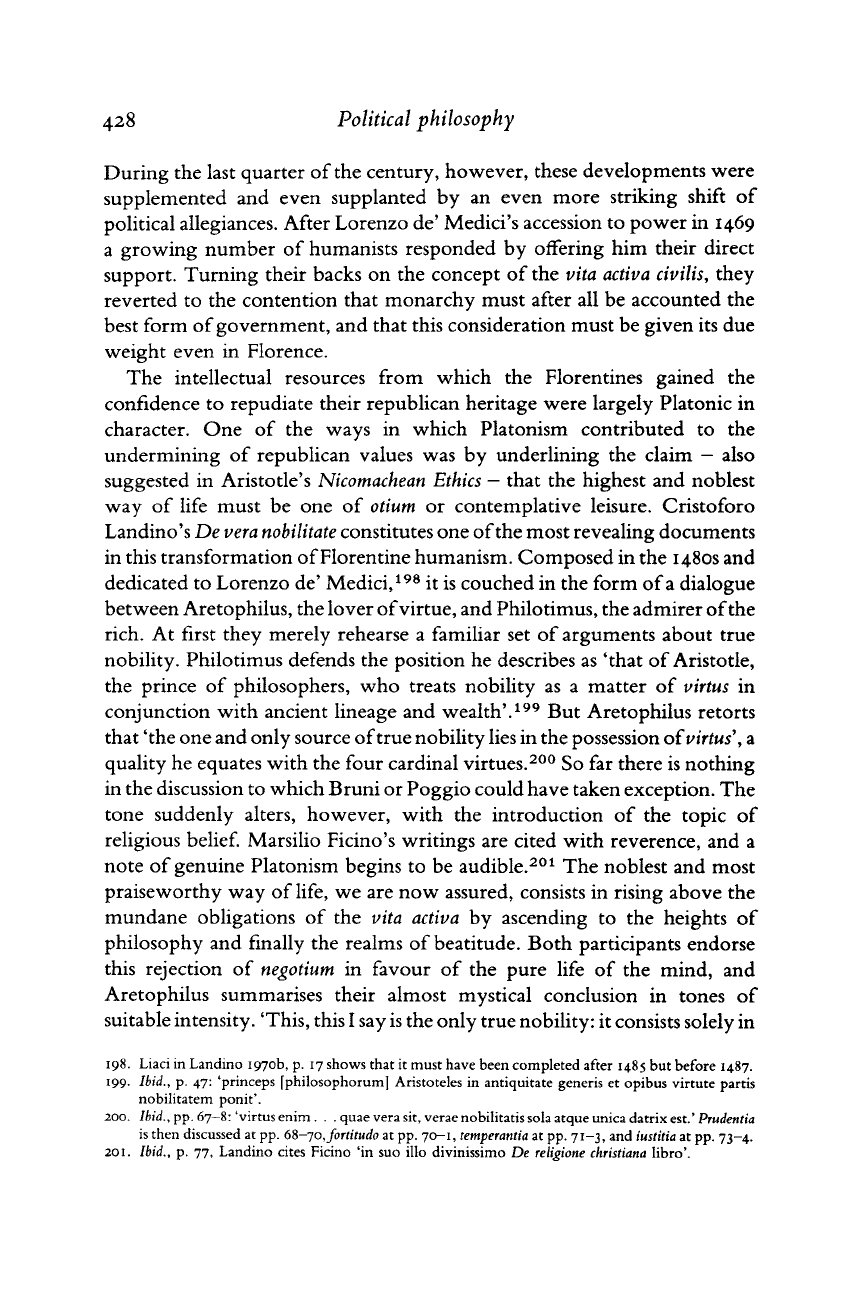
428
Political philosophy
During the last
quarter
of the century, however, these developments were
supplemented and even supplanted by an even more striking shift of
political allegiances. After Lorenzo de' Medici's accession to power in 1469
a
growing number of humanists responded by offering him their direct
support.
Turning their backs on the concept of the vita
activa
civilis,
they
reverted
to the contention that monarchy must after all be accounted the
best form
of
government, and that this consideration must be given its due
weight even in Florence.
The
intellectual resources from which the Florentines gained the
confidence to repudiate their republican heritage were largely Platonic in
character.
One of the ways in which Platonism contributed to the
undermining of republican values was by underlining the claim
—
also
suggested in Aristotle's
Nicomachean
Ethics
—
that the highest and noblest
way of
life
must be one of otium or contemplative leisure. Cristoforo
Landino's
De
vera
nobilitate
constitutes one
of
the most revealing documents
in this transformation
of
Florentine
humanism. Composed in the
1480s
and
dedicated to Lorenzo de' Medici,
198
it is couched in the form
of
a
dialogue
between Aretophilus, the lover
of
virtue,
and Philotimus, the
admirer
of
the
rich.
At first they merely rehearse a familiar set of arguments about true
nobility. Philotimus defends the position he describes as 'that of Aristotle,
the prince of philosophers, who treats nobility as a matter of virtus in
conjunction with ancient lineage and wealth'.
199
But Aretophilus retorts
that
'the one and only source
of
true
nobility
lies
in the possession
of
virtus',
a
quality he equates with the four cardinal virtues.
200
So far there is nothing
in the discussion to which Bruni or Poggio could have taken exception. The
tone suddenly alters, however, with the introduction of the topic of
religious
belief.
Marsilio Ficino's writings are cited with reverence, and a
note of genuine Platonism begins to be audible.
201
The noblest and most
praiseworthy
way of
life,
we are now assured, consists in rising above the
mundane obligations of the vita
activa
by ascending to the heights of
philosophy and finally the realms of beatitude. Both participants endorse
this rejection of negotium in favour of the pure
life
of the mind, and
Aretophilus summarises their almost mystical conclusion in tones of
suitable intensity. 'This, this
I
say is the only
true
nobility: it consists
solely
in
198. Liaci in
Landino
1970b, p. 17
shows
that
it
must
have
been
completed
after
1485 but
before
1487.
199. Ibid., p. 47:
'princeps
[philosophorum]
Aristoteles
in
antiquitate
generis
et
opibus
virtute
partis
nobilitatem
ponit'.
200. Ibid., pp. 67-8:
'virtus
enim
. . .
quae
vera
sit,
verae
nobilitatis
sola
atque
unica
datrix
est.' Prudentia
is
then
discussed
at pp.
68-70,
jortitudo at pp. 70-1, temperantia at pp. 71-3, and iustitia at pp. 73-4.
201. Ibid., p. 77,
Landino
cites
Ficino
'in suo
illo
divinissimo
De religione Christiana
libro'.
Cambridge Histories Online © Cambridge University Press, 2008
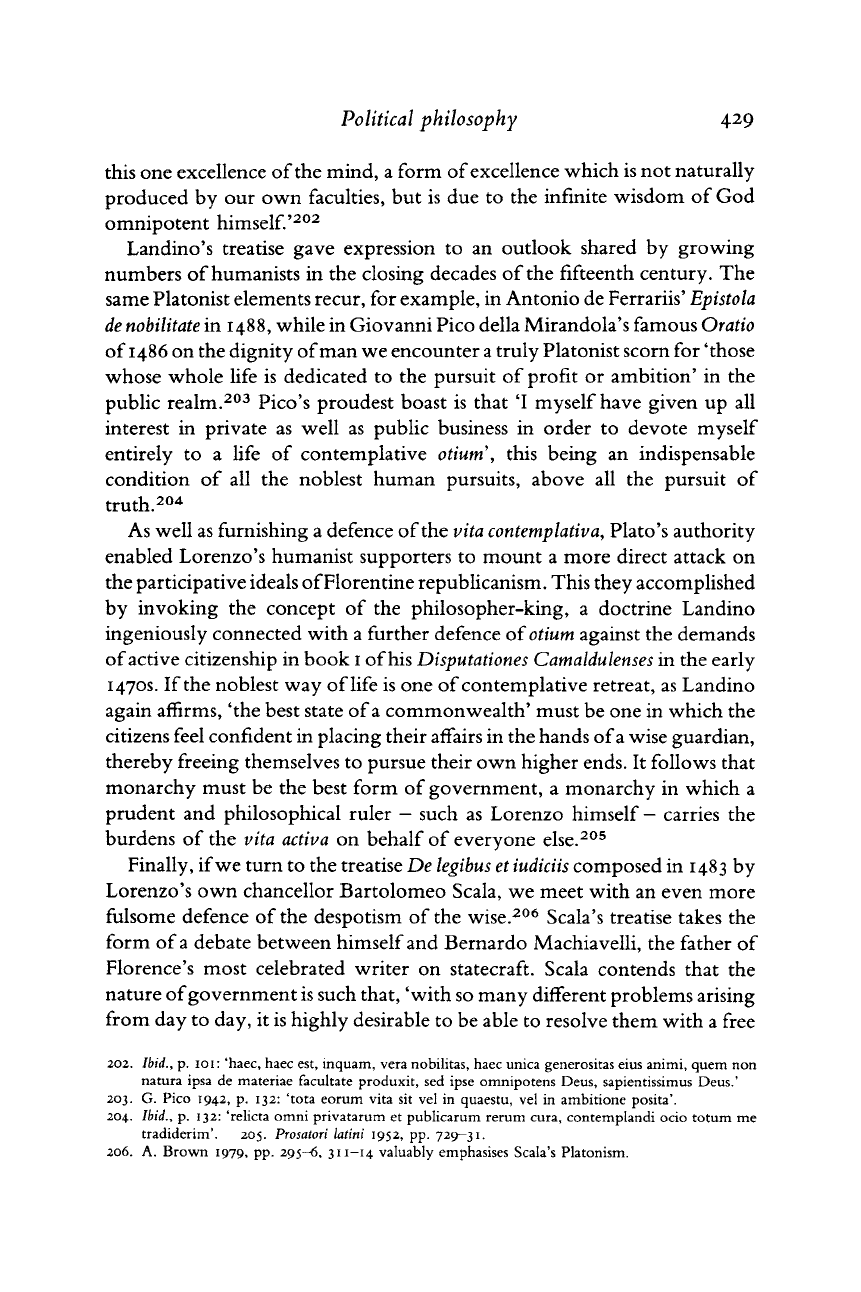
Political
philosophy
429
this one excellence
of
the mind, a form
of
excellence which is not naturally
produced by our own faculties, but is due to the infinite wisdom of God
omnipotent himself.'
202
Landino's treatise gave expression to an outlook shared by growing
numbers of humanists in the closing decades of the fifteenth century. The
same Platonist elements
recur,
for example, in Antonio de
Ferrariis'
Epistola
de
nobilitate
in
1488,
while
in Giovanni Pico della Mirandola's famous
Oratio
of
i486
on the dignity
of
man
we encounter
a
truly Platonist scorn for 'those
whose
whole
life
is dedicated to the pursuit of profit or ambition' in the
public realm.
203
Pico's proudest boast is that 'I myself have
given
up all
interest in private as
well
as public business in order to devote myself
entirely to a
life
of contemplative otium\ this
being
an indispensable
condition of all the noblest human pursuits, above all the pursuit of
truth.
204
As
well
as furnishing a defence
of
the vita
contemplativa,
Plato's authority
enabled Lorenzo's humanist supporters to mount a more direct
attack
on
the participative ideals
of
Florentine
republicanism. This they accomplished
by invoking the concept of the philosopher-king, a doctrine Landino
ingeniously connected with a further defence ofotium against the demands
of
active
citizenship in book
1
of
his Disputationes
Camaldulenses
in the early
1470s.
If the noblest way
of
life
is one of contemplative
retreat,
as Landino
again affirms, 'the best state
of
a
commonwealth' must be one in which the
citizens
feel
confident in placing their affairs in the hands
of
a
wise
guardian,
thereby
freeing themselves to pursue their own higher ends. It
follows
that
monarchy
must be the best form of government, a monarchy in which a
prudent and philosophical ruler - such as Lorenzo himself - carries the
burdens of the vita
activa
on behalf of everyone else.
205
Finally,
if
we turn to the treatise De
legibus
et
iudiciis
composed in
1483
by
Lorenzo's
own chancellor Bartolomeo Scala, we meet with an even more
fulsome defence of the despotism of the
wise.
206
Scala's treatise takes the
form
of
a
debate between himself and Bernardo Machiavelli, the father of
Florence's
most celebrated writer on statecraft. Scala contends that the
nature
of
government is such that, 'with so many different problems arising
from
day to day, it is highly desirable to be able to resolve them with a free
202. Ibid., p. 101:
'haec,
haec
est,
inquam,
vera
nobilitas,
haec
unica
generositas
eius
animi,
quern
non
natura
ipsa
de
materiae
facultate
produxit, sed
ipse
omnipotens
Deus,
sapientissimus
Deus.'
203. G.
Pico
1942, p. 132:
'tota
eorum
vita sit vel in
quaestu,
vel in
ambitione
posita'.
204. Ibid., p. 132:
'relicta
omni
privatarum et publicarum
rerum
cura,
contemplandi
ocio
totum
me
tradiderim'. 205. Prosatori latini 1952, pp. 729-31.
206. A. Brown 1979, pp.
295-6,
311-14 valuably
emphasises
Scala's
Platonism.
Cambridge Histories Online © Cambridge University Press, 2008
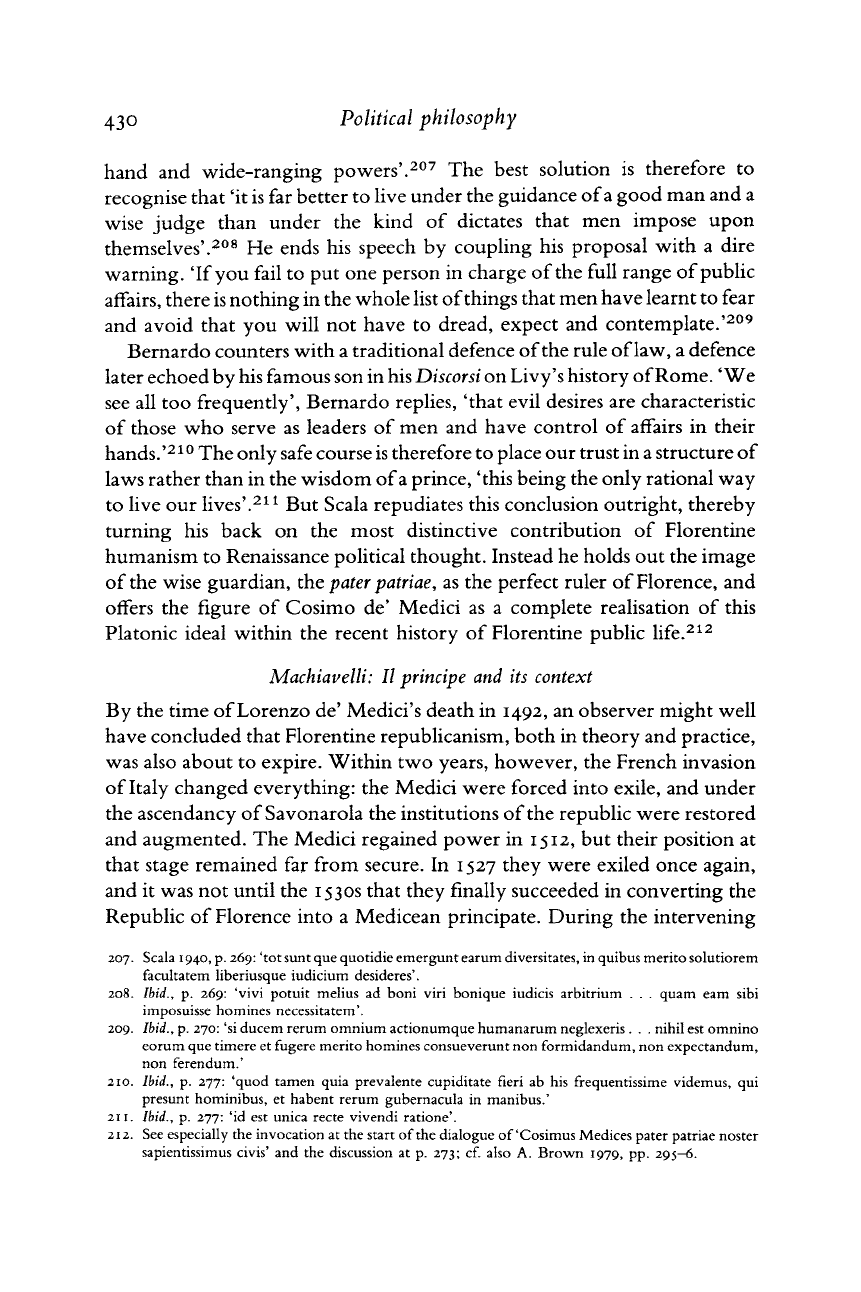
430
Political
philosophy
hand and wide-ranging powers'.
207
The best solution is therefore to
recognise that 'it is far better to
live
under the guidance
of
a
good man and a
wise
judge than under the kind of dictates that men impose upon
themselves'.
208
He ends his speech by coupling his proposal with a dire
warning. 'If you fail to put one person in charge of the
full
range of public
affairs,
there is nothing in the
whole
list
of
things that men have
learnt
to fear
and avoid that you
will
not have to dread, expect and contemplate.'
209
Bernardo
counters with a traditional defence
of
the rule
of
law, a defence
later
echoed by his famous son in his
Discorsi
on Livy's history
of
Rome.
'We
see all too frequently', Bernardo replies, 'that
evil
desires are
characteristic
of
those who serve as leaders of men and have control of affairs in their
hands.'
210
The only safe course is therefore to place our
trust
in
a
structure
of
laws
rather
than in the wisdom
of
a
prince, 'this
being
the only rational way
to
live
our lives'.
211
But Scala repudiates this conclusion outright, thereby
turning his back on the most distinctive contribution of Florentine
humanism to Renaissance political thought. Instead he holds out the image
of
the
wise
guardian, the
pater
patriae,
as the perfect ruler of
Florence,
and
offers the figure of Cosimo de' Medici as a complete realisation of this
Platonic
ideal within the recent history of Florentine public
life.
212
Machiavelli:
II
principe
and its context
By
the time
of
Lorenzo
de' Medici's death in
1492,
an observer might
well
have concluded that Florentine republicanism, both in theory and
practice,
was also about to expire. Within two years, however, the French invasion
of
Italy
changed everything: the Medici were forced into exile, and under
the ascendancy of
Savonarola
the institutions of the republic were restored
and augmented. The Medici regained power in
1512,
but their position at
that
stage remained far from secure. In
1527
they were exiled once again,
and it was not until the
1530s
that they finally succeeded in converting the
Republic of
Florence
into a Medicean principate. During the intervening
207. Scala 1940, p. 269: 'tot
sunt
que
quotidie
emergunt
earum
diversitates,
in
quibus
merito
solutiorem
facultatem
liberiusque
iudicium
desideres'.
208. Ibid., p. 269: 'vivi
potuit
melius
ad
boni
viri
bonique
iudicis
arbitrium . . . quam
earn
sibi
imposuisse
homines
necessitatem'.
209. Ibid., p. 270: 'si
ducem
rerum
omnium
actionumque
humanarum
neglexeris.
. .
nihil
est
omnino
eorum
que
timere
et
fugere
merito
homines
consueverunt
non
formidandum,
non
expectandum,
non
ferendum.'
210. Ibid., p, 277:
'quod
tamen
quia
prevalente
cupiditate
fieri
ab his
frequentissime
videmus,
qui
presunt
hominibus,
et
habent
rerum
gubernacula in
manibus.'
211.
Ibid., p. 277: 'id est
unica
recte
vivendi
ratione'.
212.
See
especially
the
invocation
at the
start
of the
dialogue
of'Cosimus
Medices pater
patriae
noster
sapientissimus
civis'
and the
discussion
at p. 273; cf.
also
A. Brown 1979, pp.
295-6.
Cambridge Histories Online © Cambridge University Press, 2008
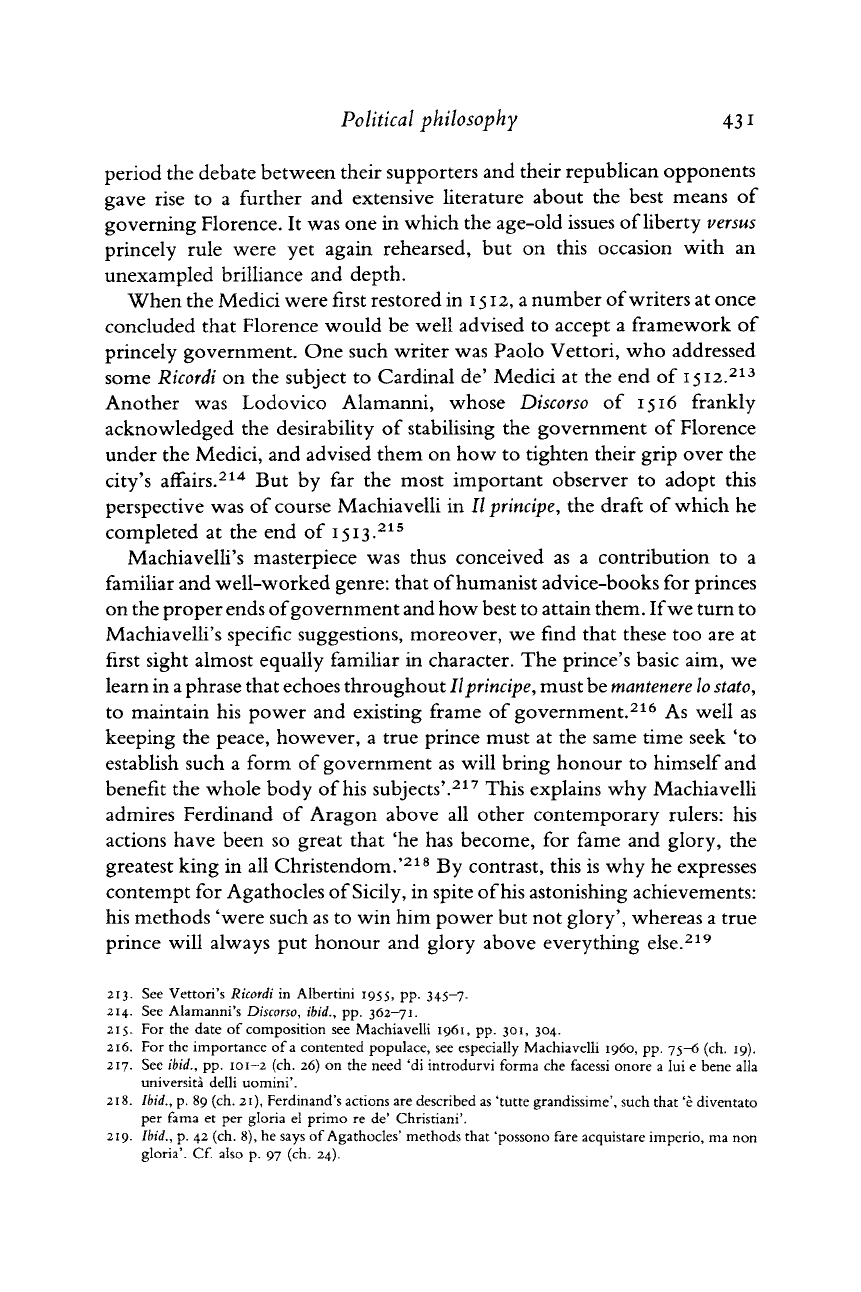
Political
philosophy
431
period the debate between their supporters and their republican opponents
gave rise to a further and extensive literature about the best means of
governing Florence. It was one in which the age-old
issues
of
liberty versus
princely rule were yet again rehearsed, but on this occasion with an
unexampled brilliance and depth.
When the Medici were first restored in
1512,
a number
of
writers
at once
concluded that Florence
would
be
well
advised to accept a framework of
princely government. One such writer was Paolo Vettori, who addressed
some
Ricordi
on the subject to Cardinal de' Medici at the end of
1512.
213
Another
was Lodovico Alamanni, whose
Discorso
of 1516 frankly
acknowledged the desirability of stabilising the government of Florence
under
the Medici, and advised them on how to tighten their grip over the
city's affairs.
214
But by far the most important observer to adopt this
perspective was of course Machiavelli in
17
principe,
the draft of which he
completed at the end of
1513.
215
Machiavelli's masterpiece was thus conceived as a contribution to a
familiar
and well-worked genre: that
of
humanist advice-books for princes
on the
proper
ends
of
government and how best to attain them.
If
we turn to
Machiavelli's specific suggestions, moreover, we
find
that these too are at
first sight almost equally familiar in
character.
The prince's basic aim, we
learn
in
a
phrase that echoes throughout
II
principe,
must be
mantenere
lo
stato,
to
maintain his power and existing frame of government.
216
As
well
as
keeping the peace, however, a true prince must at the same time seek 'to
establish such a form of government as
will
bring honour to himself and
benefit the
whole
body of his subjects'.
217
This explains why Machiavelli
admires
Ferdinand of Aragon above all other contemporary rulers: his
actions have been so great that 'he has become, for fame and glory, the
greatest
king
in all Christendom.'
218
By contrast, this is why he expresses
contempt for Agathocles of Sicily, in spite
of
his astonishing achievements:
his methods 'were such as to win him power but not glory', whereas a true
prince
will
always put honour and glory above everything else.
219
213.
See
Vettori's
Ricordi in Albertini 1955, pp.
345-7.
214. See Alamanni's
Discorso,
ibid., pp. 362-71.
215.
For the
date
of
composition
see Machiavelli 1961, pp. 301, 304.
216. For the
importance
of
a
contented
populace,
see
especially
Machiavelli
i960,
pp. 75-6 (ch. 19).
217.
See ibid., pp. 101-2 (ch. 26) on the
need
'di
introdurvi
forma
che
facessi
onore
a lui e
bene
alla
università
delli
uomini'.
218. Ibid., p. 89 (ch. 21),
Ferdinand's
actions
are
described
as
'tutte
grandissime',
such
that 'è
diventato
per fama et per
gloria
el
primo
re de' Christiani'.
219.
Ibid., p. 42 (ch. 8), he
says
of Agathocles'
methods
that
'possono
fare
acquistare
imperio,
ma non
gloria'. Cf.
also
p. 97 (ch. 24).
Cambridge Histories Online © Cambridge University Press, 2008
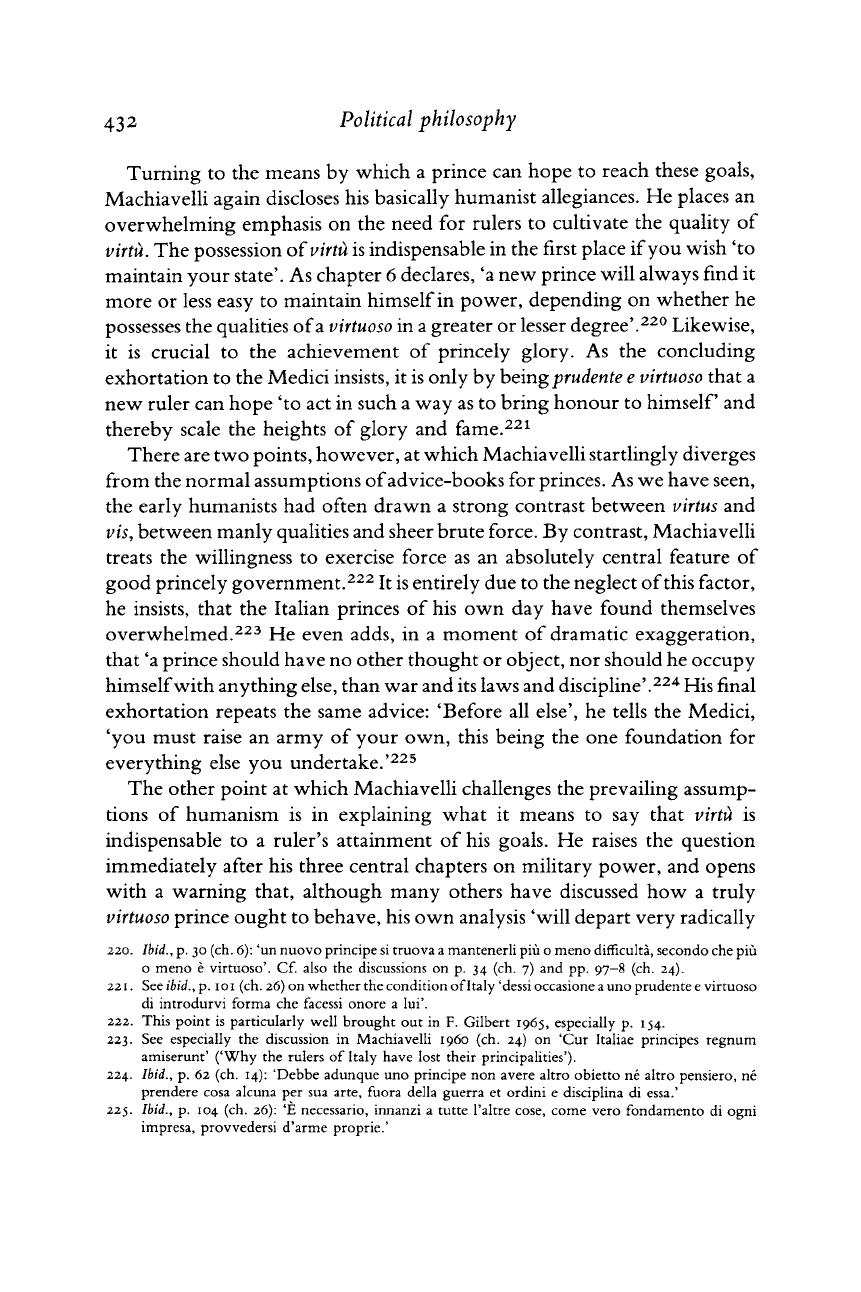
432
Political
philosophy
Turning
to the means by which a prince can hope to reach these goals,
Machiavelli again discloses his basically humanist allegiances. He places an
overwhelming emphasis on the need for rulers to cultivate the quality of
virtù.
The possession ofvirtù is indispensable in the first place
if
you
wish
'to
maintain
your
state'.
As
chapter
6 declares, 'a new prince
will
always find it
more
or
less
easy to maintain himself in power, depending on whether he
possesses the qualities
of
a
virtuoso
in a
greater
or lesser degree'.
220
Likewise,
it is crucial to the achievement of princely glory. As the concluding
exhortation
to the Medici insists, it is only by being
prudente
e
virtuoso
that a
new
ruler
can hope 'to act in such a way as to bring honour to himself and
thereby
scale the heights of glory and fame.
221
There
are
two points, however, at which Machiavelli startlingly diverges
from
the normal assumptions
of
advice-books for
princes.
As we have seen,
the
early humanists had often drawn a strong contrast between virtus and
vis,
between manly qualities and sheer
brute
force. By
contrast,
Machiavelli
treats
the
willingness
to exercise force as an absolutely central feature of
good princely government.
222
It is entirely due to the neglect
of
this
factor,
he insists, that the Italian princes of his own day have found themselves
overwhelmed.
223
He even adds, in a moment of
dramatic
exaggeration,
that
'a prince should have no other thought or object, nor should he occupy
himself with anything else, than war and its laws and discipline'.
224
His final
exhortation
repeats the same advice: 'Before all else', he tells the Medici,
'you must raise an
army
of your own, this being the one foundation for
everything else you undertake.'
225
The
other point at which Machiavelli challenges the prevailing assump-
tions of humanism is in explaining what it means to say that virtù is
indispensable to a ruler's attainment of his goals. He raises the question
immediately after his three central chapters on military power, and opens
with a warning that, although many others have discussed how a truly
virtuoso
prince ought to behave, his own analysis
'will
depart very radically
220. Ibid., p. 30 (ch. 6): 'un
nuovo
principe
si truova a
mantenerli
più о
meno
difficultà,
secondo
che più
о
meno
è
virtuoso'.
Cf.
also
the
discussions
on p. 34 (ch. 7) and pp. 97-8 (ch. 24).
221. See ibid., p. 101 (ch. 26) on
whether
the
condition
of Italy
'dessi
occasione
a
uno
prudente
e
virtuoso
di
introdurvi
forma
che
facessi
onore
a lui'.
222. This
point
is particularly
well
brought out in F. Gilbert 1965,
especially
p. 154.
223. See
especially
the
discussion
in Machiavelli
i960
(ch. 24) on 'Cur
Italiae
principes
regnum
amiserunt'
('Why the
rulers
of Italy
have
lost
their
principalities').
224. Ibid., p. 62 (ch. 14): 'Debbe
adunque
uno
principe
non
avere
altro
obietto
né
altro
pensiero,
né
prendere
cosa
alcuna
per sua arte,
fuora
della
guerra et
ordini
e
disciplina
di
essa.'
225. Ibid., p. 104 (ch. 26): 'È
necessario,
innanzi
a
tutte
l'altre
cose,
come
vero
fondamento
di
ogni
impresa,
provvedersi
d'arme
proprie.'
Cambridge Histories Online © Cambridge University Press, 2008
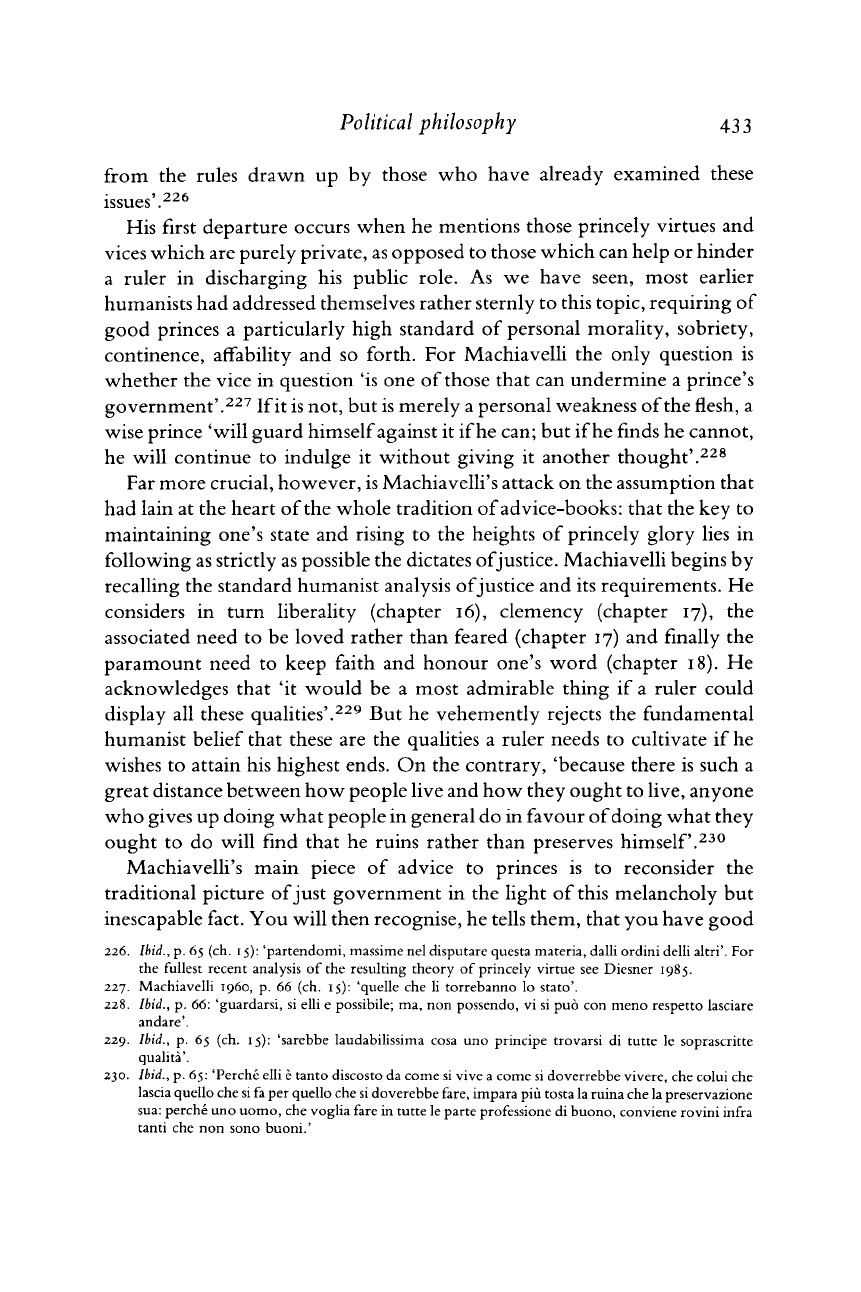
Political
philosophy
433
from
the rules drawn up by those who have already examined these
issues'.
226
His first departure occurs when he mentions those princely virtues and
vices which
are
purely private, as opposed to those which can help or hinder
a
ruler in discharging his public role. As we have seen, most earlier
humanists had addressed themselves
rather
sternly to this topic, requiring of
good princes a particularly high standard of personal morality, sobriety,
continence, affability and so forth. For
Machiavelli the only question is
whether the vice in question 'is one of those that can undermine a prince's
government'.
227
If
it is not, but is merely a personal weakness
of
the flesh, a
wise
prince
'will
guard himself against it
if
he can; but
if
he
finds
he cannot,
he
will
continue to indulge it without
giving
it another thought'.
228
Far
more
crucial,
however, is Machiavelli's
attack
on the assumption that
had lain at the heart
of
the whole tradition
of
advice-books: that the key to
maintaining one's state and rising to the heights of princely glory
lies
in
following
as strictly as possible the dictates
of
justice.
Machiavelli begins by
recalling the standard humanist analysis
of
justice and its requirements. He
considers in turn liberality (chapter 16), clemency (chapter 17), the
associated need to be loved
rather
than feared (chapter 17) and finally the
paramount
need to keep faith and honour one's word (chapter 18). He
acknowledges that 'it would be a most admirable thing if a ruler could
display all these qualities'.
229
But he vehemently rejects the fundamental
humanist belief that these are the qualities a ruler needs to cultivate if he
wishes
to attain his highest ends. On the
contrary,
'because there is such a
great
distance between how people
live
and how they ought to live, anyone
who
gives
up doing what people in general do in favour
of
doing what they
ought to do
will
find
that he ruins
rather
than preserves himself'.
230
Machiavelli's main piece of advice to princes is to reconsider the
traditional
picture
of
just government in the light of this melancholy but
inescapable fact. You
will
then recognise, he tells them, that you have good
226. Ibid., p. 65 (ch. 15):
'partendomi,
massime
nel
disputare
questa
materia,
dalli
ordini
delli
altri'. For
the
fullest
recent
analysis
of the
resulting
theory
of
princely
virtue
see
Diesner
1985.
227. Machiavelli
i960,
p. 66 (ch. 15):
'quelle
che li
torrebanno
lo
stato'.
228. Ibid., p. 66:
'guardarsi,
si
elli
e
possibile;
ma, non
possendo,
vi si può con
meno
respetto
lasciare
andare'.
229. Ibid., p. 65 (ch. 15):
'sarebbe
laudabilissima
cosa
uno
principe
trovarsi
di
tutte
le
soprascritte
qualità'.
230. Ibid., p. 65:
'Perché
elli
è
tanto
discosto
da
come
si
vive
a
come
si
doverrebbe
vivere,
che
colui
che
lascia
quello
che si fa per
quello
che si
doverebbe
fare,
impara
più
tosta
la
mina
che la
preservazione
sua:
perché
uno
uomo,
che
voglia
fare
in
tutte
le
parte
professione
di
buono,
conviene
rovini
infra
tanti
che non
sono
buoni.'
Cambridge Histories Online © Cambridge University Press, 2008
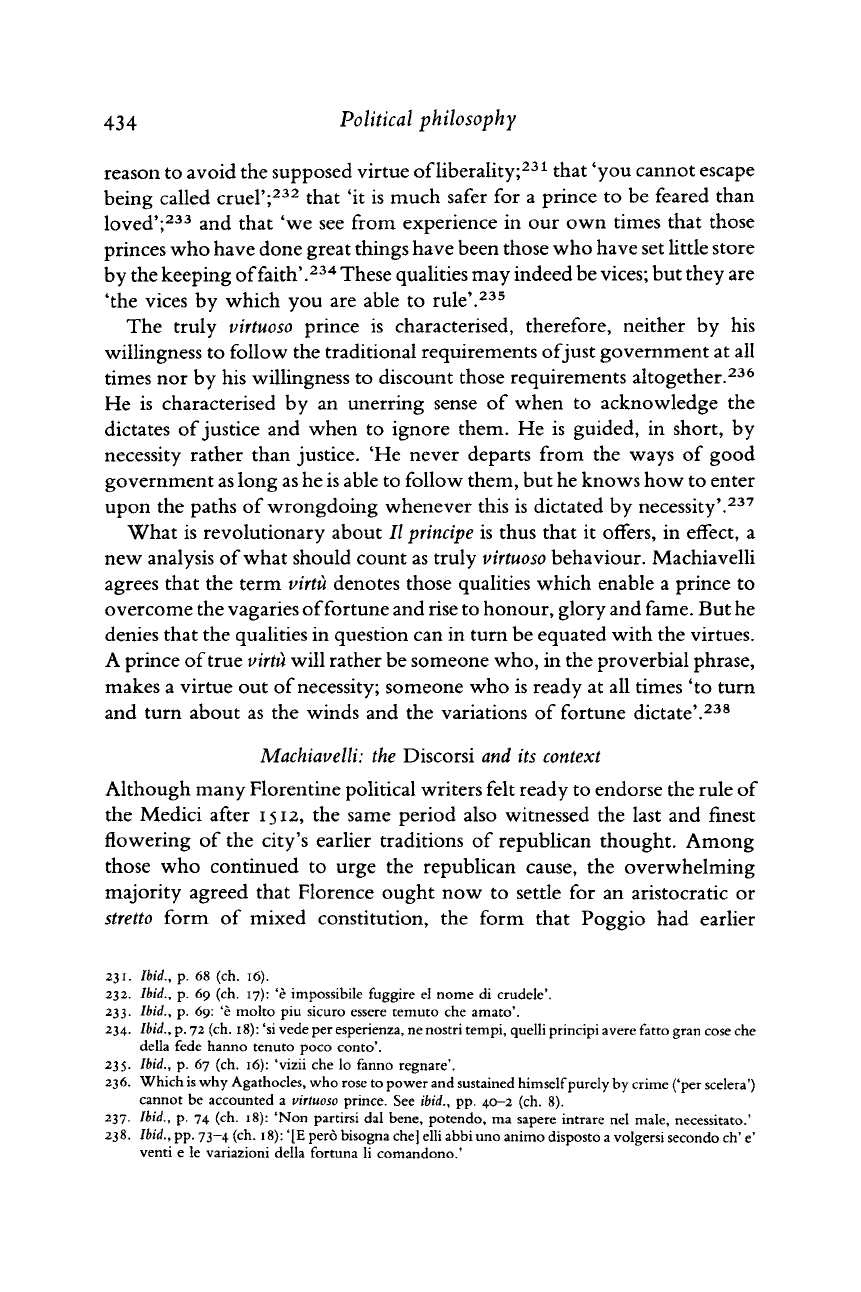
434
Political
philosophy
reason to avoid the supposed virtue
of
liberality;
231
that 'you cannot escape
being
called cruel';
232
that 'it is much safer for a prince to be feared than
loved';
233
and that 'we see from experience in our own times that those
princes who have done great things have been those who have set little store
by the
keeping
of
faith'.
234
These qualities may indeed be vices; but they are
'the vices by which you are able to rule'.
235
The truly virtuoso prince is characterised, therefore, neither by his
willingness
to
follow
the traditional requirements
of
just government at all
times nor by his
willingness
to discount those requirements altogether.
236
He is characterised by an unerring sense of
when
to acknowledge the
dictates of justice and
when
to ignore them. He is guided, in short, by
necessity
rather
than justice. 'He never departs from the ways of good
government as
long
as he is able to
follow
them, but he
knows
how to enter
upon the paths of wrongdoing whenever this is dictated by necessity'.
237
What
is revolutionary about //
principe
is thus that it offers, in effect, a
new analysis of what should count as truly virtuoso behaviour. Machiavelli
agrees that the term virtu denotes those qualities which enable a prince to
overcome the vagaries
of
fortune and rise to honour, glory and fame. But he
denies
that the qualities in question can in turn be equated
with
the virtues.
A
prince
of
true
virtu
will
rather
be someone who, in the proverbial phrase,
makes a virtue out of necessity; someone who is ready at all times 'to turn
and turn about as the
winds
and the variations of fortune dictate'.
238
Machiavelli:
the Discorsi and its context
Although many Florentine political writers
felt
ready to endorse the rule of
the Medici after
1512,
the same period also
witnessed
the last and
finest
flowering
of
the city's earlier traditions of republican thought. Among
those who continued to urge the republican cause, the overwhelming
majority
agreed that Florence ought now to settle for an aristocratic or
stretto
form of mixed constitution, the form that Poggio had earlier
231. Ibid., p. 68 (ch. 16).
232. Ibid., p. 69 (ch. 17): 'è
impossibile
fuggire
el
nome
di
crudele'.
233. Ibid., p. 69: 'è
molto
più
sicuro
essere
temuto
che
amato'.
234. Ibid., p. 72 (ch. 18): 'si
vede
per
esperienza,
ne
nostri
tempi,
quelli
principi
avere
fatto
gran
cose
che
della
fede
hanno
tenuto
poco
conto'.
235. Ibid., p. 67 (ch. 16):
'vizii
che lo
fanno
regnare'.
236.
Which
is why
Agathocles,
who
rose
to
power
and
sustained
himself
purely
by
crime
('per
scelera')
cannot
be
accounted
a virtuoso
prince.
See ibid., pp. 40-2 (ch. 8).
237. Ibid., p. 74 (ch. 18): 'Non
partirsi
dal
bene,
potendo,
ma
sapere
intrare
nel
male,
necessitato.'
238. Ibid., pp. 73-4 (ch. 18): '[E
però
bisogna
che]
elli
abbi uno
animo
disposto
a
volgersi
secondo
eh' e'
venti
e le
variazioni
della
fortuna
li
comandono.'
Cambridge Histories Online © Cambridge University Press, 2008
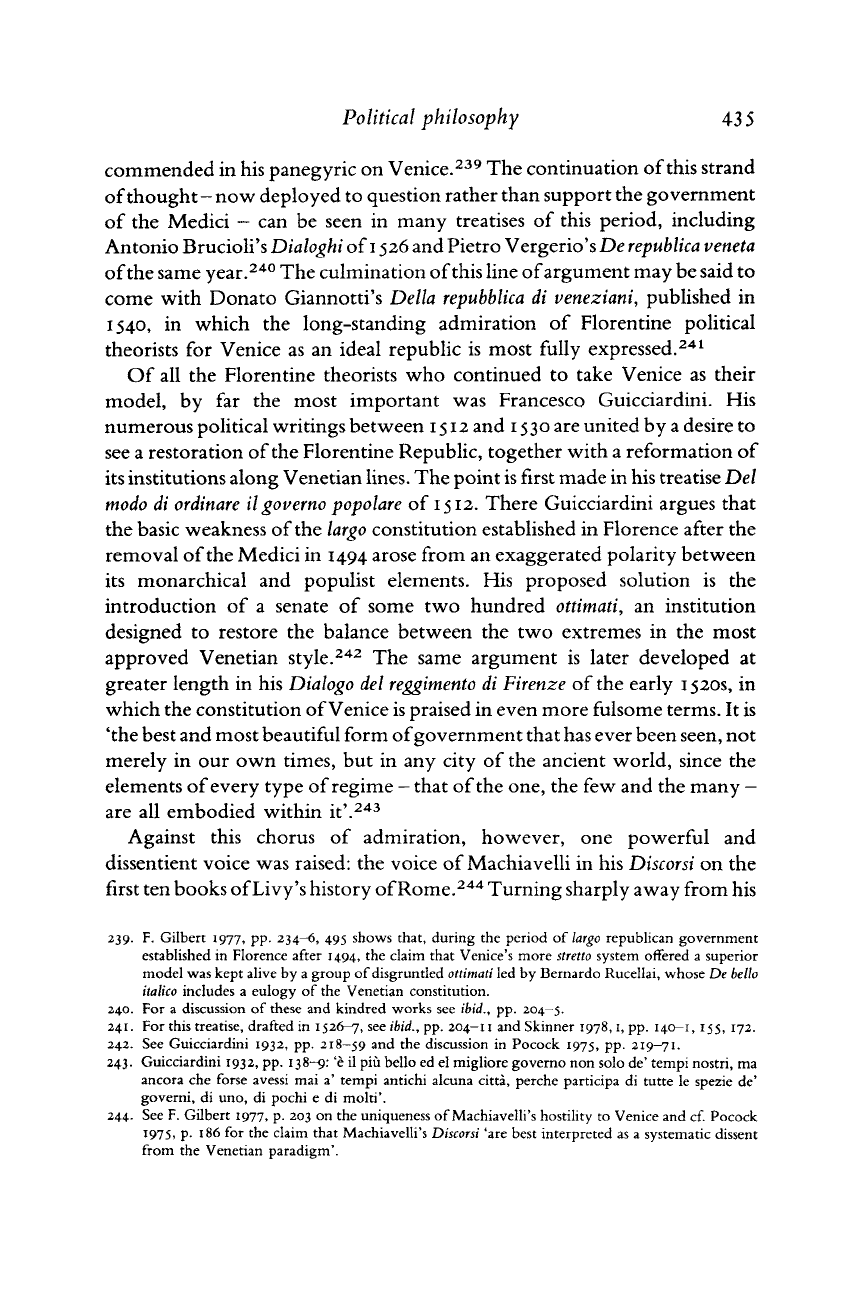
Political
philosophy
43
5
commended in his panegyric on Venice.
239
The continuation
of
this strand
of
thought-now deployed to question
rather
than support the government
of
the Medici - can be seen in many treatises of this period, including
Antonio Brucioli's
Dialoghi
of
1526
and
Pietro
Vergerio's
De
república
veneta
of
the
same
year.
240
The culmination
of
this line
of
argument
may be said to
come
with Donato Giannotti's
Della
repubblica
di
veneziani,
published in
1540,
in which the long-standing admiration of Florentine political
theorists
for Venice as an ideal republic is most
fully
expressed.
241
Of
all the Florentine theorists who continued to take Venice as their
model, by far the most important was
Francesco
Guicciardini. His
numerous political writings between
1512
and
1530
are
united by
a
desire to
see a restoration
of
the
Florentine Republic, together with a reformation of
its institutions along Venetian lines. The point is first made in his
treatise
Del
modo
di
ordinare
il
governo
popolare
of
1512.
There Guicciardini argues that
the
basic weakness
of
the
largo
constitution established in Florence after the
removal
of
the
Medici in
1494
arose from an exaggerated polarity between
its monarchical and populist elements. His proposed solution is the
introduction
of a senate of some two hundred ottimati, an institution
designed to restore the balance between the two extremes in the most
approved
Venetian style.
242
The same argument is later developed at
greater
length in his
Dialogo
del
reggimento
di
Firenze
of the early
1520s,
in
which the constitution
of
Venice is praised in even more fulsome
terms.
It is
'the
best and most beautiful form
of
government
that
has ever been seen, not
merely
in our own times, but in any city of the ancient world, since the
elements
of
every
type
of
regime
—
that
of
the
one, the few and the many
—
are
all embodied within it'.
243
Against this chorus of admiration, however, one powerful and
dissentient voice was raised: the voice of Machiavelli in his
Discorsi
on the
first ten books
of
Livy's
history
of
Rome.
244
Turning sharply away from his
239. F. Gilbert 1977, pp.
234-6,
495
shows
that, during the
period
of
largo
republican
government
established
in
Florence
after 1494, the
claim
that
Venice's
more
stretto
system
offered
a
superior
model
was kept
alive
by a group of
disgruntled
ottimati led by Bernardo Rucellai,
whose
De
bello
italico
includes
a
eulogy
of the Venetian
constitution.
240. For a
discussion
of
these
and kindred works see ibid., pp.
204—5.
241. For
this
treatise,
drafted in 1526—7, see ibid., pp. 204-11 and Skinner 1978,1, pp. 140-1, 155, 172.
242. See Guicciardini 1932, pp. 218—59 and the
discussion
in Pocock 1975, pp. 219—71.
243. Guicciardini 1932, pp. 138-9: 'è il più
bello
ed el
migliore
governo
non
solo
de'
tempi
nostri,
ma
ancora che
forse
avessi
mai a'
tempi
antichi
alcuna città,
perche
participa di
tutte
le
spezie
de'
governi, di uno, di
pochi
e di
molti'.
244. See F. Gilbert 1977. P- 203 on the
uniqueness
of Machiavelli's
hostility
to Venice and cf. Pocock
1975»
p- 186 for the
claim
that Machiavelli's
Discorsi
'are
best
interpreted
as a
systematic
dissent
from
the Venetian paradigm'.
Cambridge Histories Online © Cambridge University Press, 2008
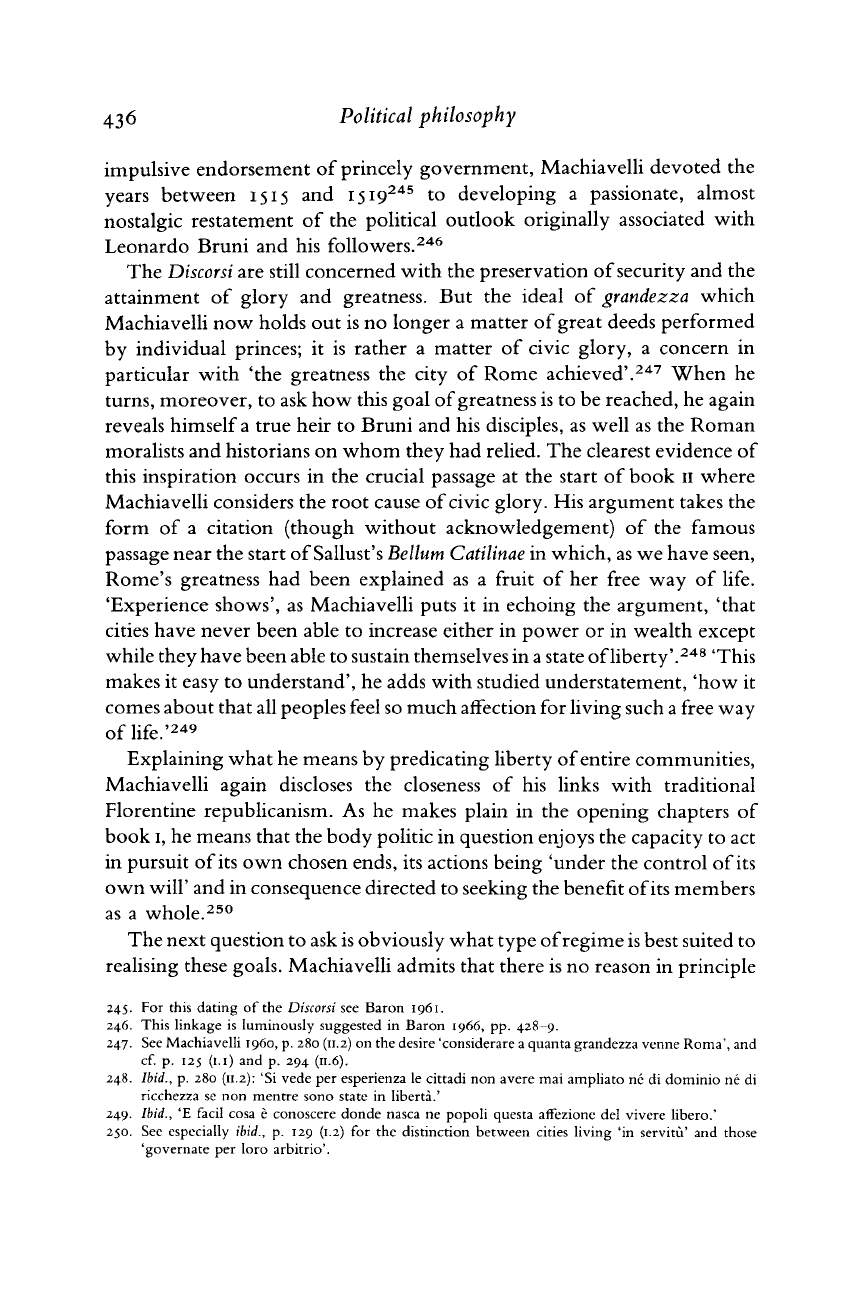
436
Political
philosophy
impulsive endorsement of princely government, Machiavelli devoted the
years
between 1515 and
1519
245
to developing a passionate, almost
nostalgic restatement of the political outlook originally associated with
Leonardo
Bruni and his followers.
246
The
Discorsi
are
still
concerned with the preservation
of
security
and the
attainment
of glory and greatness. But the ideal of
grandezza
which
Machiavelli now holds out is no longer a
matter
of
great
deeds performed
by individual princes; it is
rather
a
matter
of civic glory, a concern in
particular
with 'the greatness the city of Rome achieved'.
247
When he
turns,
moreover, to ask how this goal
of
greatness is to be reached, he again
reveals himself
a
true
heir to Bruni and his disciples, as
well
as the Roman
moralists and historians on whom they had relied. The clearest evidence of
this inspiration occurs in the crucial passage at the
start
of book
11
where
Machiavelli considers the root cause of civic glory. His argument takes the
form
of a citation (though without acknowledgement) of the famous
passage near the
start
of Sallust's
Bellum
Catilinae
in which, as we have seen,
Rome's greatness had been explained as a fruit of her free way of
life.
'Experience
shows', as Machiavelli puts it in echoing the argument, 'that
cities have never been able to increase either in power or in wealth except
while
they have been able to sustain themselves in
a
state
of
liberty'.
248
'This
makes it easy to understand', he adds with studied understatement, 'how it
comes about that all peoples
feel
so much affection for
living
such a free way
of
life.'
249
Explaining what he means by predicating liberty
of
entire
communities,
Machiavelli again discloses the closeness of his
links
with traditional
Florentine
republicanism. As he makes plain in the opening chapters of
book
1,
he means that the body politic in question enjoys the capacity to act
in pursuit
of
its own chosen ends, its actions
being
'under the control of its
own
will'
and in consequence directed to
seeking
the benefit
of
its members
as
a whole.
250
The
next question to ask is obviously what type
of
regime is best suited to
realising these goals. Machiavelli admits that there is no reason in principle
245. For
this
dating
of the
Discorsi
see Baron 1961.
246. This
linkage
is
luminously suggested
in Baron 1966, pp.
428-9.
247. See Machiavelli
i960,
p. 280 (11.2) on the
desire
'considerare
a quanta grandezza
venne
Roma', and
cf. p. 125 (1.1) and p. 294 (11.6).
248. Ibid., p. 280 (11.2): 'Si
vede
per
esperienza
le cittadi non
avere
mai
ampliato
né di
dominio
né di
ricchezza
se non
mentre
sono
state
in libertà.'
249. Ibid., 'E facil
cosa
è
conoscere
donde
nasca
ne
popoli
questa
affezione
del
vivere
libero.'
250. See
especially
ibid., p. 129 (1.2) for the
distinction
between
cities
living
'in
servitù'
and
those
'governate
per
loro
arbitrio'.
Cambridge Histories Online © Cambridge University Press, 2008
